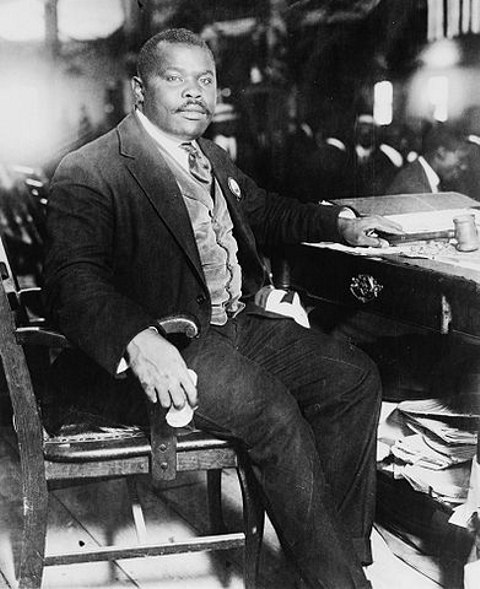|
|
|
Marcus Garvey (1887–1940). (Wikimedia Commons) |
Marcus Garvey was born in Jamaica in 1887. He founded his Universal Negro Improvement Association (UNIA) in 1914.
UNIA stressed racial pride and self-improvement, much like the views of educator Booker T. Washington, whom Garvey admired. Garvey, however, had greater international ambitions, including the development of worldwide black-owned industries and shipping lines. He also called for the end of white colonial rule in Africa.
At the invitation of Washington, Garvey traveled to the United States in 1916. He soon established his UNIA in New York City, opened a restaurant, and started a newspaper. In 1919, he formed the Black Star Line, the first black-owned shipping company in the United States.
The publicity over the Black Star Line caused great excitement among black Americans, many of whom bought stock in it. Garvey organized huge parades to promote this and other UNIA projects. He often appeared in a colorful uniform, wearing a plumed hat.
In 1920, more than 20,000 people attended Garvey’s first UNIA convention in New York. The convention produced a Declaration of Negro Rights, which denounced lynchings, segregated public transportation, job discrimination, and inferior black public schools. The document also demanded “Africa for the Africans.” Without actually consulting any African people, the convention proclaimed Garvey the “Provisional President of Africa.”
Garvey believed that white society would never accept black Americans as equals. Therefore, he called for the separate self-development of African Americans within the United States.
The UNIA set up many small black-owned businesses such as restaurants, groceries, a publishing house, and even a toy company that made black dolls. Garvey’s goal was to create a separate economy and society run for and by African Americans.
Ultimately, Garvey argued, all black people in the world should return to their homeland in Africa, which should be free of white colonial rule. Garvey had grand plans for settling black Americans in Liberia, the only country in Africa governed by Africans. But, Garvey’s UNIA lacked the necessary funds and few blacks in the United States indicated any interest in going “back to Africa.”
A poor economy and the near-bankruptcy of the Black Star Line caused Garvey to seek more dues-paying members for the UNIA. He launched a recruitment campaign in the South, which he had ignored because of strong white resistance.
In a bizarre twist, Garvey met with a leader of the Ku Klux Klan in Atlanta in 1922. Garvey declared that the goal of the UNIA and KKK was the same: completely separate black and white societies. Garvey even praised racial segregation laws, explaining that they were good for building black businesses. Little came of this recruitment effort. Criticism from his followers grew.
In 1922, the U.S. government arrested Garvey for mail fraud for his attempts to sell more stock in the failing Black Star Line. At his trial, the evidence showed that Garvey was a poor businessman, but the facts were less clear about outright fraud. The jury convicted him anyway, and he was sentenced to prison.
In 1927, President Calvin Coolidge commuted his sentence, and he was released. The government immediately deported him to Jamaica.
His vision for black separatism and “back to Africa” never caught on with most African Americans, and he and his spectacular movement soon faded away. Garvey died in 1940, an almost forgotten man.
For Further Reading
Stein, Judith. The World of Marcus Garvey: Race and Class in Modern Society. Baton Rouge, La.: Louisiana State University Press, 1991.


